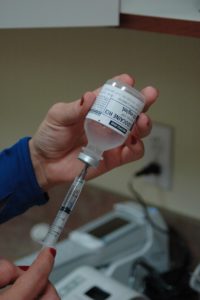It’s hard to turn on the news these days without hearing about it: overdoses from prescription drugs have reached epidemic levels. The number of opioid overdose deaths increased 21% from 2015 to 2016and data from 2017 shows the problem worsening. In Pennsylvania, rates of death from opioid overdoses are above the national average.
As a firm of legal nurse consultants, we feel it’s important for those in both the medical and legal communities to stay well-informed about the opioid crisis, especially those working and living in Pennsylvania. If you have medical questions pertaining to your pharmaceutical or medical malpractice case, or are in need of legal nurse consulting services, please reach out to our experts at 724-487-0519 or kelly@cardinallifecare.com. Read on to learn more about the opioid epidemic and how it affects doctors, patients, nurses and the general public.
Why is there an opioid epidemic in the U.S.?
For the last few decades, the pharmaceutical industry has been aggressively marketing prescription opioids, such as OxyContin, Percocet and Vicodin, as painkillers. Doctors, in an effort to give patients a pain-free experience, began prescribing these highly-addictive drugs at an increasing and alarming rate—even to patients with minor injuries. Opioids became popular for treating conditions with chronic pain, such as:
- Cancer
- Arthritis
- Migraines
- Multiple sclerosis
- Fibromyalgia
- Autoimmune disorders
- Back pain
- Nerve pain
More and more patients developed an addiction to pain pills, so even as prescription rated declined, overdoses increased thanks to street drugs like heroin and illicit fentanyl.
Nurses and Opioid Addiction
For those in the medical community under immense stress and working long shifts (nurses, for example), pain pills present their own risk. A combination of continuous traumatic stress and burnout syndrome (BOS) at work, plus the accessibility to prescription painkillers can often lead to addiction. The number of U.S. nurses abusing prescription drugs is climbing as well, with numbers more than doubling from 1999 to 2006.
Recognizing Opioid Addiction

Physical signs of opioid abuse may go unnoticed for a long period of time, but are not invisible. Those suffering from addiction to opioids may exhibit signs such as:
- Dilated pupils
- Frequent nausea or vomiting
- Tremors
- Fatigue
- Sudden weight loss/gain
- Hyperactivity
- Frequent irritability/anger
- Insomnia
Safe Prescribing Practices for Chronic Pain
There is no one cure for the opioid epidemic, and opioids are an important and necessary advancement in the medical community. However, doctors can employ safe prescribing practices to reduce the chances of addiction and overdose. One method is to find alternative treatments for chronic pain.
Unlike acute pain, chronic pain occurs over a long period of time, which means medication must be taken over a long period of time. This presents a problem if the pain management medication is addictive, as is the case with opioids.
The that doctors use nonopioid treatment to the extent possible for chronic pain and engaging patients actively in their pain management efforts to increase the success of treatment without the risk of addiction. Nonopioid treatments include:
- Patient education,
- Acetaminophen, NSAIDs & other anti-inflammatory drugs,
- Exercise, diet and weight loss,
- Cognitive behavioral or biofeedback therapy,
- Nonopioid medications like beta-blockers, TCAs, pregabalin, duloxetine, milnacipran, SSRIs, and more.
Legal Ramifications Amidst the Opioid Crisis – Suing A Doctor for Overprescribing
The government and police enforcement are beginning to crack down on over prescribing. All doctors prescribing opioids understand the risks and dangers associated with them. It is a doctor’s responsibility to not only use caution when prescribing addictive painkillers, but also be extremely vigilant for signs of addiction. Failure to do so may constitute medical malpractice.

To prove negligence and successfully sue a doctor for overprescribing, a legal nurse consultant and expert medical witness—such as those at Cardinal LifeCare—will likely need to:
- Review patient’s medical history.
- Perform Independent Medical Exam (IME).
- Find and examine all prescriptions.
- Analyze medical evidence.
Lawsuits Against Pharmaceutical Companies
Many lawyers also decide to take legal action against pharmaceutical companies involved in the addiction or even wrongful death of a patient who has been prescribed opioids. Some lawyers, including former Mississippi AG Mike Moore (famous for a 50-state, $246 billion agreement against Big Tobacco) think that now is the time to hold drug companies accountable for their role in the opioid epidemic.
Dozens of lawsuits across the country have emerged alleging that the companies triggered the opioid crisis by deemphasizing the risk of addiction and overdose. In addition to pharma companies, the lawsuits name as defendants doctors who were funded by the pharmaceutical companies to push pro-opioid research without proof of efficacy in treatment of chronic pain.
Noting that the epidemic is a costly one, the class action lawsuits against pharmaceutical companies are aiming to put the financial burden onto Big Pharma, not the public.
Answers to Medical Questions about Opioid Addiction, Withdrawal and Overdose
A medical expert is vital in any action taken against doctors or pharmaceutical companies. To speak with a life care planning expert on our staff about our legal nurse consulting services and how they might be of use in your case, please call us at 724-487-0519 or leave a message through our website and we’ll get back to you as soon as possible.




